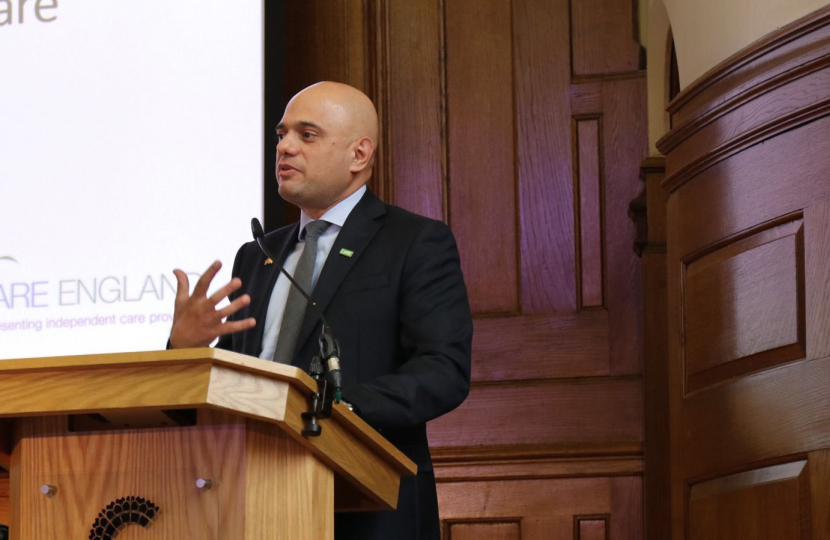
Thank you Martin for the introduction.
I’ve just come from parliament, where the Chancellor has just delivered the Spring Statement: our plan to tackle the cost of living – including many of you and your businesses - and support the UK’s Recovery after Covid. So, it’s fitting to join you on this beautiful spring day to talk about “facing the future”.
Before I do, I want to take a moment to look back: we can’t face the future without acknowledging what has been, without question, the most testing and traumatic two years that any of us can remember. I’m under no illusion that, even with bright days ahead of us, the experience of the pandemic will live with us for many many years to come.
I spent my half-term travelling over 1,000 miles around the country on what we called the ‘Road to Recovery’ tour. The greatest honour of all was meeting phenomenal staff across the health and social care sector.
I went with Martin on a visit to Willows Care Home in Romford. One lady I met called Sarah, used to work at Deutsche Bank just like me. We joked about how we’d ended up working in the care sector, and she told me how rewarding she finds her new career, telling me: “I’d never go back”.
I also heard from care providers about the enormous pressures they’ve faced, especially over the last two years. The pandemic was fast-moving - it meant that our guidance had to change quickly too. I’m so grateful for the way you all responded. I cannot imagine a more challenging time than the last two years, thank you for all you have done and keep doing.
This afternoon I want to reflect on the months and years ahead of us as we learn to live with Covid in the care sector.
As with healthcare, the pandemic has taken us to a crossroads: a point where we can no longer ignore the major choices that have loomed large for so long. Neither can we kick them any further along the road.
I believe Recovery and Reform are now two sides of the same coin; we cannot have one without the other.
Turning first to Recovery, as we begin to think about what social care might look like in a post-pandemic world.
Vaccination remains crucial -and as we begin our Spring Boosters, I’m adamant we continue to build that wall of defence against Covid.
According to recent estimates from UKHSA, our boosters have already helped prevent around 160,000 hospitalisations since mid-December.
It matters because Omicron is serious. Just ask the health and care professionals on the front line in Hong Kong today, where the unvaccinated are sadly paying a very high price. Our jabs have saved tens of thousands of lives and will continue to do so.
‘Living with Covid’ doesn’t mean living with totally avoidable risks, and I’m adamant that vaccination is an essential part of the post-pandemic world too – and as part of that broader look ahead, we’ll set out our ‘Living with Covid’ plan for Social Care.
Even as we recover, there’s no time to lose to reform – and that work is already well underway. Ultimately, it’s about a 10-year vision for social care.
Realising that vision begins with our landmark Health and Social Care Bill – which, subject to parliamentary approval, will enable greater integration and better quality care.
April 1st will also be a significant turning point for our country: the introduction of the Health and Social Care Levy, something the Chancellor just talked about in parliament. Over time, an increasing share of funding raised will be spent on adult social care in England, helping put the sector on a sustainable financial footing for decades to come.
But I recognise there are more immediate needs, so we’re investing an additional £5.4 billion in adult social care over the next three years, including: £3.6 billion to move towards paying providers a fairer rate for care and protecting people from extortionate and unpredictable care costs; and we’re putting £1.7 billion to improve the social care system – including at least £500 million to support our biggest asset: the workforce.
It means we can accelerate a comprehensive programme of reform right now: moving us towards the vision I know we all share: of social care with greater choice and control; that supports people to lead independent lives; where people can access outstanding quality and personalised care; and one that is fair and accessible.
It’s a 10-year vision reflected across two recent White Papers: the “People at the Heart of Care” White Paper and the Health and Social Care Integration White Paper.
It’s also a vision that’s shared across government. It’s really is a cross-government endeavour. I’m grateful to the Levelling Up Secretary and his department for all the important work they’re doing with local government to integrate social care and health.
And I’m delighted we’re joined by so many other partners today, including, of course, Care England, who has been a pivotal player in developing these important plans.
We’ve worked with over 200 organisations on the adult social care White Paper plans as well as drawing on the vital expertise of people with lived experience of care. Our plans are stronger for it.
So, today I want to reflect on three areas of that work: workforce, housing and technology.
Starting with the workforce: because they are our greatest asset, and social care is nothing without them.
On my recent tour, I spoke to someone who made home visits to help an elderly man with dementia. She would help him go to bed each night. Because of his mental condition, he would swear and shout at the top of his voice. I asked her: “How do you put up with this every day?”. And she said to me, “He’s not well – and that’s just the job”.
I’m in awe of the professionalism and dedication of the social care workforce – and I’m determined for them to have more chances to develop and progress with their careers.
Our half a billion-pound workforce investment seeks to address that, including plans for portable care certificates, a new skills passport and leadership development and support.
Taken together, there will be hundreds of thousands of training places and certifications, helping deliver the professional and regulated workforce we all want to see.
And this must be equally true for those delivering care at home: home care and domestic care workers must have parity of esteem with others in the sector. It’s vital because I believe so much of health and care begins at home.
So, allow me to turning to Housing. I know the majority of people want to live in their own homes for as long as possible – and as independently as possible. I’m determined we help as many people as possible realise that ambition.
The truth is: so many of the decisions about care are, in reality, decisions about housing.
I want many more people to have the dignity and pride that comes with living behind your own front door.
The plans in the Social Care White Paper will ensure we embed housing into local health and care strategies and make funds accessible to increase the availability of supported housing. As part of this, we announced an investment of at least £300 million in housing over the next three years.
It’s also clear we simply need to build more units: and our continued investment of over £200 million in the Care and Support Specialised Housing Fund will accelerate the development of specialist affordable housing that meets the needs of older people and adults with disabilities or mental health challenges.
Even as we continue this vital drive on supported housing, I recognise that most people who draw on some form of care and support will continue to live in mainstream housing. To help with this we are committing a further £573 million per year to fund the Disabled Facilities Grant, so people can make the practical adaptations to their homes that they need.
Ultimately, whether it’s in the workforce or housing, all of this is about putting more power in people’s hands, the ability to make more choices.
Back when I was a student in Exeter, I’d visit a care home as a volunteer for a charity called Community Action on Saturdays. I kept residents’ company, especially a lady called Margaret who I became very fond of.
It’s over thirty years ago, but the experience left a real impression on me. What hasn’t changed since then is the importance of dignity and the dedication of care workers.
But what has changed, brings me to my third point, however, is the incredible new care technology with the potential to improve the quality of care. I’ve just seen some at the exhibitions here. I know you heard from Matthew Gould and Tim Ferris this morning, but I want to share some reflections of my own.
The £150 million we’re investing to drive digitisation in social care is not a ‘nice to have’; it’s an absolute necessity.
We know that digitising records brings huge advances, yet 40 percent of providers still have almost entirely paper-based records. I think Digital Records are basic responsibility, and that’s why I’ve set the target of 80 percent of social care providers digitising care records by March 2024. In doing that, you will have our absolute support.
I recognise that a lot of this also amounts to a culture change - and I know that’s something you’re all keen to embrace. This is happening in the health sector too, it’s similar challenges we face. As Matthew and Tim set out, we’re determined to support you in that endeavour, supporting providers with the connectivity and digital skills they will need to recover and reform in the years ahead.
A lot of this promising technology is already with us. Think about falls, for example. We know that 40 percent of admissions to care homes from the community are due to falls. We have the technology, not just for detecting falls but even to prevent some of them from happening in the first place.
I’m also excited about what machine learning and AI can offer in helping us deliver care that is personalised.
This Spring, we’ll publish our first-ever comprehensive Digital Health and Care Plan -which will help us to have joint health and social care records. It will be an essential stepping stone on our vital journal to transform social care through technology, drive unprecedented integration with the NHS and, ultimately, improve people’s lives.
All of this work, across the workforce, housing and technology, sits alongside our 10-year vision for social care, which also includes our vital mission to encourage innovation, to provide better information and advice, and to ensure unpaid carers are better supported.
I’m very proud of the work that we’ve already got underway, which I believe gives a sense of the scale of ambition for what we can achieve in the decade to come.
Together, we’ve risen to meet so many of the challenges of the last two years. We’re at a crossroads now and there’s no turning back. There’ll be no more kicking the can down the road.
I’m determined we meet the work of recovery and reform with the same sense of urgency we’ve shown over the last two years.
And on this important journey, it’s a privilege for me to have partners like all of you. Thank you all very much.
Published 23 March 2022

